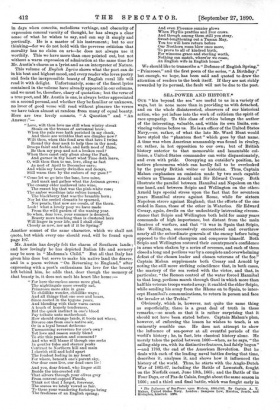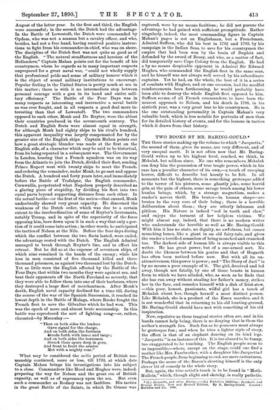SEA-POWER AND HISTORY.*
OUR "kin beyond the sea" are useful to us in a variety of ways, but in none more than in providing us with detached, and on the whole disinterested, observers of our historical action, who yet infuse into the work of criticism the spirit of race sympathy. To this class of critics belongs the author of the interesting, valuable, and, within its own limits, con- vincing volume before us. He is an officer of the United States Navy,—or, rather, of what the late Mr. Ward Hunt would have styled the "phantom fleet" which goes by that name. A time was when American seamanship was found in rivalry, or, rather, in hot opposition to our own; but of British history anterior to that memorable and lamentable col- lision, a• United States commander can write dispassionately, and even with pride. Occupying an outsider's position, he notices phenomena which can hardly fail to be overlooked by the purely British writer or historian. Thus, Captain Mahan emphasises an omission made by two such capable writers as Thomas Arnold and Sir Edward Creasy. Both illustrate the parallel between Hannibal and Napoleon on the one hand, and between Scipio and Wellington on the other. Arnold lays special stress upon the fact that for seventeen years Hannibal strove against Rome, while for sixteen Napoleon strove against England; that the efforts of the one ended in Zama, those of the other in Waterloo. Sir Edward Creasy, again, dwells on the undoubtedly interesting circum- stance that Scipio and Wellington both held for many years commands of high importance, but distant from the main theatres of warfare, and that "it wan in Spain that Scipio, like Wellington, successively encountered and overthrew nearly all the subordinate generals of the enemy before being opposed to the chief champion and conqueror himself. Both Scipio and Wellington restored their countrymen's confidence in arms when shaken by a series of reverses, and each of them closed a long and perilous war by a complete and overwhelming defeat of the chosen leader and chosen veterans of the foe." Captain Mahan supplements both Creasy and Arnold by noting the still more striking coincidence that, in both cases, the mastery of the sea rested with the victor, and that, in particular, "the Roman control of the water forced Hannibal to that long, perilous march through Gaul in which more than half his veteran troops wasted away; it enabled the elder Scipio, while sending his army from the Rhone on to Spain, to inter- cept Hannibal's communications, to return in person and face the invader at the Trebia."
Obviously, which is, however, not quite the same thing as superficially, there is a great deal of truth in these remarks,—so much so that it is rather surprising that it should not have been stated before. Captain Mahan's plan, however, of enforcing the lesson he wishes to teach, is an eminently sensible one. He does not attempt to show the influence of sea-power at all eventful periods of the world's history ; he, in fact, lets classical history alone. He merely takes the period between 1660—when, as he says, "the sailing-ship era, with its distinctive features, had fairly begun" —and 1783, the end of the American Revolution. But he . deals with each of the leading naval battles during that time, describes it, analyses it, and shows how it influenced the history of the world. Thus, he starts with the Anglo-Dutch War of 1665-67, including the Battle of Lowestoft, fought on the Norfolk coast, June 13th, 1665; and the Battle of the Four Days, or of Pas de Calais, fought about the same season in 1666; and a third and final battle, which was fought early in * The Injtuence of Sea-Power upon History. 1660-1783. By Captain A. T. Mahan, United States Navy. Leaden: Sampson Low, Marston. Searle, and Rivington. Limited. 1890.
August of the latter year. In the first and third, the English
were successful; in the second, the Dutch had the advantage. In the Battle of Lowestoft, the Dutch were commanded by -Opdam, who was not a seaman but a cavalry officer, and who,
besides, had not a free hand, having received positive instruc- tions to fight from his commander-in-chief, who was on shore. The discipline of the Dutch fleet was not quite so good as of the English. "The natural steadfastness and heroism of the Hollanders," Captain Mahan points out for the benefit of his countrymen, whom he regards as in many important respects unprepared for a great naval war, "could not wholly supply that professional pride and sense of military honour which it is the object of sound military institutions to encourage.
Popular feeling in the United States is pretty much at sea in this matter; there is with it no intermediate step between personal courage with a gun in its hand and entire mili- tary efficiency." The Battle of the Four Days was in many respects as interesting and instructive a naval battle as was ever fought, and in all respects a good deal more in- teresting than that of Lowestoft. The two commanders opposed to each other, Monk and De Ruyter, were the ablest their countries produced in the seventeenth century. The Dutch and English fleets were almost equal in strength, /or although Monk had eighty ships to his rival's hundred, this apparent inequality was largely compensated for by the greater size of the English ships. Captain Mahan points out low a great strategic blander was made at the first on the English side, of a character which may be said to be historical, from its being repeated in a subsequent war. The Government in London, hearing that a French squadron was on its way from the Atlantic to join the Dutch, divided their fleet, sending Prince Rupert west• with twenty ships to meet the French, and ordering the remainder, under Monk, to go east and oppose the Dutch. A hundred and forty years later, and immediately before the Battle of Trafalgar, the English commander, Cornwallis, perpetrated what Napoleon properly described as a glaring piece of stupidity, by dividing his fleet into two .equal parts beyond supporting distance from each other. In the actual battle—or the first of the series—that ensued, Monk undoubtedly showed very great capacity. He discerned the weakness of the Dutch order, which was due to a certain extent to the insubordination of some of Ruyter's lieutenants, notably Tromp, and in spite of the superiority of the force opposing him, bore down upon it in such a way that only a por- tion of it could come into action ; in other words, he anticipated the tactics of Nelson at the Nile. Before the four days during which the conflict between the two fleets lasted, were ended, the advantage rested with the Dutch. The English Admiral managed to break through Rnyter's line, and to effect his retreat. But he did so at the expense of seventeen ships, of which nine remained in the hands of the enemy; while his loss in men consisted of five thousand killed and three thousand prisoners, as against two thousand lost by the Dutch.
Yet so little were the English affected by the Battle of the Four Days, that within two months they were again at sea, and beat their opponents off the North Foreland so severely, that they were able to follow them into one of their harbours, where they destroyed a large fleet of merchantmen. After Monk's death, English naval capacity declined for a time till, during the course of the war of the Spanish Succession, it reached its lowest depth in the Battle of Malaga, where Rooke fought the French fleet to save the Gibraltar which he had won. This was the epoch of mere and almost brute seamanship. In this battle was reproduced the sort of fighting sung—or, rather, chaunted—by Macaulay :—
"Then on both sides the leaders Gave signal for the charge,
And on both sides the footmen strode forth with lance and targe ; And on both sides the horsemen Struck their spurs deep in gore, And front to front the armies Met with a mighty roar."
What may be considered the =die period of British sea- manship continued, more or less, till 1783, at which date Captain Mahan brings his investigations into his subject to a close. Commanders like Hood and Hughes were, indeed, preparing the way for Nelson and the great era of British capacity, as well as of supremacy upon the sea. But even such a commander as Rodney was not faultless. His tactics in the great Battle of the Saints, in which De Grasse was captured, were by no means faultless ; he did not pursue the advantage he had gained with sufficient promptitude. Rather singularly, indeed, the most commanding figure in Captain Mahan's pages is not an Englishman, but a Frenchman, Admiral Suffren, who did his best in 1782 and 1783, by his campaign in the Indian Seas, to save for his countrymen the empire that had been won by the brain of Dupleix and defended by the sword of Bussy, and who, as a matter of fact, did temporarily save Cape Colony from the English. He had a by no means despicable opponent in Admiral Sir Edward Hughes, who commanded the English fleet in the same seas, and he himself was not always well served by his subordinate captains. Yet he had, on the whole, the best of it in a series of combats with Hughes, and on one occasion, had the needful reinforcements been forthcoming, he would probably have been able to destroy the whole English fleet opposed to him. Suffren seems, of all French commanders, to have been the nearest approach to Nelson, and his death in 1788, in his sixtieth year, was a very great loss to his countrymen. He is the one outstanding personality in Captain Mahan's very valuable book, which is less notable for portraits of men than for its detailed history of events, and for the lessons in tactics which it draws from that history.



































 Previous page
Previous page